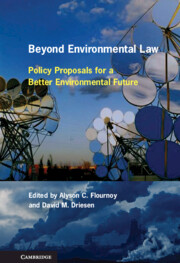Book contents
- Frontmatter
- Contents
- List of Figure and Tables
- About the Contributors
- Preface
- Acknowledgments
- Part I National Environmental Legacy Act
- 1 The Case for the National Environmental Legacy Act
- 2 The Necessity of Procedural Reform
- 3 Shifting Baselines and Backsliding Benchmarks: The Need for the National Environmental Legacy Act to Address the Ecologies of Restoration, Resilience, and Reconciliation
- 4 Valuing Nature: The Challenge of the National Environmental Legacy Act
- 5 Citizen Science and the Next Generation of Environmental Law
- 6 Creating National Environmental Legacy Act Information: The Double Standard
- 7 The Constitution and Our Debt to the Future
- Part II Environmental Competition Statute
- Index
- References
6 - Creating National Environmental Legacy Act Information: The Double Standard
Published online by Cambridge University Press: 05 June 2012
- Frontmatter
- Contents
- List of Figure and Tables
- About the Contributors
- Preface
- Acknowledgments
- Part I National Environmental Legacy Act
- 1 The Case for the National Environmental Legacy Act
- 2 The Necessity of Procedural Reform
- 3 Shifting Baselines and Backsliding Benchmarks: The Need for the National Environmental Legacy Act to Address the Ecologies of Restoration, Resilience, and Reconciliation
- 4 Valuing Nature: The Challenge of the National Environmental Legacy Act
- 5 Citizen Science and the Next Generation of Environmental Law
- 6 Creating National Environmental Legacy Act Information: The Double Standard
- 7 The Constitution and Our Debt to the Future
- Part II Environmental Competition Statute
- Index
- References
Summary
In the scientific and technical world, information and data are commonly judged on their accuracy and precision, repeatability, and, more generally, the degree to which they truthfully reflect conditions in the real world.…In political and policymaking circles, a primary criteria for good information is relevance – does it deal directly with the question at hand, does it illuminate the issue in way that points to a solution?
Robin O'Malley, Kent Cavender-Barnes, and William Clark, Environment Magazine, May 1, 2003THE NATIONAL ENVIRONMENTAL LEGACY ACT (LEGACY ACT OR Act) would create a profound transformation in national resource policy if it did no more than declare a presumptive, clearly enforceable standard for the nation's future resource management. However, implementingthe Legacy Act's substantive goals also requires the utilization of a rich and, in many respects new, information base that must be sufficiently refined to be accessible to resource managers at many government levels. The Legacy Act is grounded in the development and refinement of this distinctive data foundation. State and local governments, as well as federal resource managers, will be substantially challenged by the innovations inherent to this essential data resource. In the end, the data required by and developed pursuant to Legacy Act should meet two standards: it should be scientifically and technically credible, and it should be policy relevant.
- Type
- Chapter
- Information
- Beyond Environmental LawPolicy Proposals for a Better Environmental Future, pp. 129 - 144Publisher: Cambridge University PressPrint publication year: 2010



